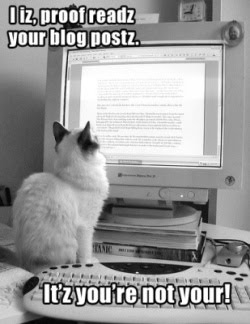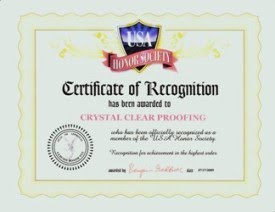Proofreading is the final stage of the "checking" process of written matieral, which involves copyediting and proofreading. There is a difference between the two, and there are different forms of each, e.g., editorial proofreading, line editing, substantive editing, etc. In many cases, the "line" between them is very fine. In this post, I'll be using the term "proofreading" to encompass the processes involved in that final "check".
Just a few key points to keep in mind when proofreading, are:
1) Use a second set of eyes
2) Read out loud
3) Slow down
Working with someone else is vital in ensuring that your finished work is the best it can be. It is twice as hard to detect errors in your own work than in someone else's! So having a second set of eyes not only helps in finding errors, but they may also see things you don't and be able to offer suggestions.
Reading out loud is beneficial in that, many times we HEAR a mistake rather than SEE it. Our minds are so accustomed to seeing what they want, that frequently even common mistakes are missed. I'm sure you've seen the email that makes its rounds a few times a year where a page is compiled completely of misspelled words, yet we're able to read it with no problem. Our brains know what we're SUPPOSED to see, not necessarily what is actually there.
Common areas where errors occur are in usage (a good example being accept and except), and trasposition of letters (where you may have typed from when you meant form). Another good example is using the same adjective two or more times in the same sentence. By slowing down, reading each word separately and taking your time, you're more likely to catch these common mistakes.
Good proofreaders see mistakes in spelling, punctuation and grammar as if they were highlighted on the page. Going beyond just the basics, they know and can HEAR what is right; and they serve very well as that second set of eyes.
Wednesday, July 22, 2009
Wednesday, July 15, 2009
Meaning and Proper Use of "i.e. and e.g."
The Latin abbreviations i.e. and e.g. are the cause of confusion for many people, and are often used incorrectly. There is a very simple way to know which is proper to use, simply by understanding their meanings and what they stand for.
"I.e." which, written out fully in Latin is "Id Est," means "that is," or "in other words." The second example, "in other words," beginning with the letter "i" is an excellent way to remember its meaning, (i.e. = in other words). It specifies, or makes more clear.
"E.g." comes from the Latin "Exempli Gratia" and its translation is "for the sake of an example." Again, there is a very easy way to remember the meaning and therefore usage of the abbreviation, in that "example" is in its description, (e.g. = example). "E.g." is also used in expressions similar to "including," when you're not intending to list everything that is being discussed.
Both i.e. and e.g. are most frequently used mid-sentence, and therefore are not capitalized. However, if you begin a sentence with one of them, e.g., "I.e." stands for "in other words," then you would follow the rules of capitalization, and the "I" would be uppercase.
Used mid-sentence, both i.e. and e.g. are always surrounded by commas. A comma ALWAYS comes after both abbreviations; the only time a comma does not precede one of them, is if you use one to begin a sentence. Both I.e. and E.g. look funny to most readers, but it is proper, following the rules of capitalization.
Some people question whether or not i.e. and e.g. should be italicized. The most accepted rule in grammar and answer to that question is that, both being such common abbreviations, they do not require italicization.
Hopefully this will give you a better understanding, i.e., clarify for you the difference between and the proper use of these abbreviations, so that when you're writing, e.g., that novel, you will have no problem determining which to use.
"I.e." which, written out fully in Latin is "Id Est," means "that is," or "in other words." The second example, "in other words," beginning with the letter "i" is an excellent way to remember its meaning, (i.e. = in other words). It specifies, or makes more clear.
"E.g." comes from the Latin "Exempli Gratia" and its translation is "for the sake of an example." Again, there is a very easy way to remember the meaning and therefore usage of the abbreviation, in that "example" is in its description, (e.g. = example). "E.g." is also used in expressions similar to "including," when you're not intending to list everything that is being discussed.
Both i.e. and e.g. are most frequently used mid-sentence, and therefore are not capitalized. However, if you begin a sentence with one of them, e.g., "I.e." stands for "in other words," then you would follow the rules of capitalization, and the "I" would be uppercase.
Used mid-sentence, both i.e. and e.g. are always surrounded by commas. A comma ALWAYS comes after both abbreviations; the only time a comma does not precede one of them, is if you use one to begin a sentence. Both I.e. and E.g. look funny to most readers, but it is proper, following the rules of capitalization.
Some people question whether or not i.e. and e.g. should be italicized. The most accepted rule in grammar and answer to that question is that, both being such common abbreviations, they do not require italicization.
Hopefully this will give you a better understanding, i.e., clarify for you the difference between and the proper use of these abbreviations, so that when you're writing, e.g., that novel, you will have no problem determining which to use.
Labels:
grammar,
I.e. and e.g.,
word meaning,
word usage
Thursday, July 9, 2009
They're, Their and There
In the first post to this blog, I made reference to the confusion and often misuse of they're, their and there. Well, it's time we take a look at these three variations!
The first I'll address, and probably the easiest to remember, is they're. They're is a contraction of the words they and are. A contraction is the combination of two words, e.g., wasn't - (was and not), couldn't - (could and not)...you get the idea. So in the context of what you're writing, if the two words used separately make sense, then you're (you are) using the correct form.
Their is a possessive adjective. "Their choice of words is correct." Perhaps the i in their could help you; (i - mine) being possessive. (A special note of interest about their - this form is often misspelled, possibly because of the general rule, "i before e except following c;" it's one of those words that doesn't comply with the "rule") - which is WEIRD.
There on the other hand, is usually used when referring to a place, (They live over there), or as a pronoun to introduce a sentence (There are three versions of the word). Here you have a word where a letter - "r" is placed between two identical letters, - "e". If you're unsure, say to yourself, "I'm placing the r between the e's," thus you are referring to a place. Another trick that might help you remember is that here is in the word there, and here is a place. As for abstract uses of the word, is it a pronoun you're beginning a sentence with? Your safest bet is the process of elimination. If they're and their do not fit, chances are you want to use there.
In the following sentence can you see the use of the three forms being used correctly?
"They're hoping that their books will sell there."
They are hoping that their (remember i - possessive) books will sell there (you placed the r between two e's; and here is part of the word) - a place.
And remember - while spell check is a wonderful tool, it's not going to catch an incorrect word choice! All three forms of this word will pass spell check (if they're spelled correctly!) But it may not be the correct form of the word for the context of what you're writing! Enabling grammar check will help, but mastering the differences of these words on your own is empowering! C'mon!! You can do it! THERE is nothing to it!
Now, did you catch that? They're and their would not be correct - try it: They're (they are) is nothing to it; Their (possessive - I, mine) is nothing to it. Neither is right, so by process of elimination, and the fact that it's a pronoun used to introduce a sentence, the proper choice is THERE.
The first I'll address, and probably the easiest to remember, is they're. They're is a contraction of the words they and are. A contraction is the combination of two words, e.g., wasn't - (was and not), couldn't - (could and not)...you get the idea. So in the context of what you're writing, if the two words used separately make sense, then you're (you are) using the correct form.
Their is a possessive adjective. "Their choice of words is correct." Perhaps the i in their could help you; (i - mine) being possessive. (A special note of interest about their - this form is often misspelled, possibly because of the general rule, "i before e except following c;" it's one of those words that doesn't comply with the "rule") - which is WEIRD.
There on the other hand, is usually used when referring to a place, (They live over there), or as a pronoun to introduce a sentence (There are three versions of the word). Here you have a word where a letter - "r" is placed between two identical letters, - "e". If you're unsure, say to yourself, "I'm placing the r between the e's," thus you are referring to a place. Another trick that might help you remember is that here is in the word there, and here is a place. As for abstract uses of the word, is it a pronoun you're beginning a sentence with? Your safest bet is the process of elimination. If they're and their do not fit, chances are you want to use there.
In the following sentence can you see the use of the three forms being used correctly?
"They're hoping that their books will sell there."
They are hoping that their (remember i - possessive) books will sell there (you placed the r between two e's; and here is part of the word) - a place.
And remember - while spell check is a wonderful tool, it's not going to catch an incorrect word choice! All three forms of this word will pass spell check (if they're spelled correctly!) But it may not be the correct form of the word for the context of what you're writing! Enabling grammar check will help, but mastering the differences of these words on your own is empowering! C'mon!! You can do it! THERE is nothing to it!
Now, did you catch that? They're and their would not be correct - try it: They're (they are) is nothing to it; Their (possessive - I, mine) is nothing to it. Neither is right, so by process of elimination, and the fact that it's a pronoun used to introduce a sentence, the proper choice is THERE.
Labels:
grammar,
Their and There,
They're,
Word Choice,
word meaning,
word usage
Thursday, July 2, 2009
FREEDOM
This weekend we celebrate our nation's freedom and independence.
Many of us get together will friends and family, and look forward to a beautiful display of fireworks. But how many of us actually stop and think about the meaning behind this all-important day we celebrate? As we're all aware, freedom is not free. Having that freedom has granted us the privilege of expressing whatever thoughts we may have; writing about whatever interests us or is on our minds. Freedom of speech and of the press impacts each of us tremendously. Without it, none of the networking sites and blogging sites we participate in would exist.
While enjoying the holiday weekend, take a moment to reflect on just how important our freedom is. Not to be taken for granted, but to be revered as one of the most vital and important elements of what makes our nation so great.
May all of you have a wonderful and Happy Fourth of July! Let freedom ring!!
Many of us get together will friends and family, and look forward to a beautiful display of fireworks. But how many of us actually stop and think about the meaning behind this all-important day we celebrate? As we're all aware, freedom is not free. Having that freedom has granted us the privilege of expressing whatever thoughts we may have; writing about whatever interests us or is on our minds. Freedom of speech and of the press impacts each of us tremendously. Without it, none of the networking sites and blogging sites we participate in would exist.
While enjoying the holiday weekend, take a moment to reflect on just how important our freedom is. Not to be taken for granted, but to be revered as one of the most vital and important elements of what makes our nation so great.
May all of you have a wonderful and Happy Fourth of July! Let freedom ring!!
Labels:
Freedom of Speech,
Freedom of the Press
Subscribe to:
Posts (Atom)






























































